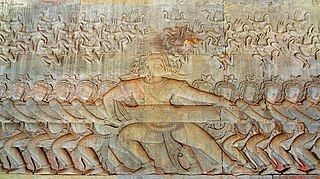
Asuras are a class of beings in Indian religions. They are described as power-seeking beings related to the more benevolent Devas in Hinduism. In its Buddhist context, the word is translated as "titan", "demigod", or "antigod".

The daityas are a race of asuras in Hindu mythology, descended from Kashyapa and his wife, Diti. Prominent members of this race include Hiranyaksha, Hiranyakashipu, and Mahabali, all of whom overran the earth, and required three of Vishnu's avataras to be vanquished.

Deva means "shiny", "exalted", "heavenly being", "divine being", "anything of excellence", and is also one of the Sanskrit terms used to indicate a deity in Hinduism. Deva is a masculine term; the feminine equivalent is Devi. The word is a cognate with Latin deus ("god") and Greek Zeus.

The Samudra Manthana is a major episode in Hinduism that is elaborated in the Vishnu Purana, a major text of Hinduism. The Samudra Manthana explains the origin of the elixir of eternal life, amrita.

An asura in Buddhism is a demigod or titan of the Kāmadhātu. They are described as having three heads with three faces each and either four or six arms.

Stylos or Stilos is a village and part of the Apokoronas municipal unit in the Chania regional unit of the Greek island of Crete. The Greek etymology of the name of the village is 'column' or 'pillar'. No existing topographical or surviving architectural feature could account for this naming.

In Hindu cosmology, the Kshira Sagara or Ocean of Milk is the fifth from the centre of the seven oceans. It surrounds the continent known as Krauncha. According to Hindu scriptures, the devas and asuras worked together for a millennium to churn this ocean in order to acquire amrita, the elixir of immortal life. The episode is mentioned in the Samudra Manthana chapter of the Puranas, a body of ancient Hindu legends. The Kshira Sagara is described as the place where the deity Vishnu reclines over his serpent-mount Shesha, accompanied by his consort, Lakshmi.

Swinhoe's snipe,, also known as forest snipe or Chinese snipe, is a medium-sized, long-billed, migratory wader.

Asura is a genus of moths in the subfamily Arctiinae, and subtribe Nudariina erected by Francis Walker in 1854.

Deiva Thai is a 1964 Indian Tamil-language film, produced and co-written by R. M. Veerappan, directed by P. Madhavan and starring M. G. Ramachandran. It was released on 18 July 1964 and became one of the most successful Tamil films of the year.

The allagion was a Byzantine military term designating a military unit of 50-400 soldiers. It first appeared in the mid-to-late 10th century, and by the 13th century had become the most frequent term used for the Byzantine army's standing regiments, persisting until the late 14th century.

Asura's Wrath is an action video game developed by CyberConnect2 and published by Capcom. It was first announced at the Tokyo Game Show in 2010, and was released worldwide in February 2012. The game was released on PlayStation 3 and Xbox 360.

14 Megala Tragoudia is a compilation album by popular Greek singer Despina Vandi containing some of her most successful singles under the EMI Music Greece label. It was part of a CD collection with the general title 14 Megala Tragoudia.
Asura avernalis is a moth of the family Erebidae. It is found on the Solomon Islands and Bougainville Island.
Asura discisigna is a moth of the family Erebidae. It is found in India and on Borneo.
Asura inconspicua is a moth of the family Erebidae first described by Frederic Moore in 1878. It is found in the Nilgiri Mountains of India.
Asura quadrilineata is a moth of the family Erebidae. It is found on Aru and in Australia.

Cyme sexualis is a moth of the subfamily Arctiinae first described by Felder in 1864. It is found on Ambon, Sulawesi, the Dampier Archipelago. and in New Guinea.
Susna is an asura described in Hindu texts. Normally associated with drought, Susna is often described as possessing a snake-like form with horns. He is an enemy of the deity Indra.

Kanniyin Kathali is a 1949 Indian Tamil-language romantic comedy film directed by K. Ramnoth, who produced it with A. K. Sekhar and wrote the screenplay. An adaption of the play Twelfth Night by William Shakespeare, it stars Madhuri Devi, Anjali Devi and S. A. Natarajan. The film revolves around the twins Adithan and Chandrika, who are separated in a shipwreck. Chandrika falls in love with Prince Vasanthakumar, who in turn is in love with Megala Devi. Upon meeting Chandrika, Megala falls in love with her, thinking she is a man. Kanniyin Kathali was released on 6 August 1949.














